Photo
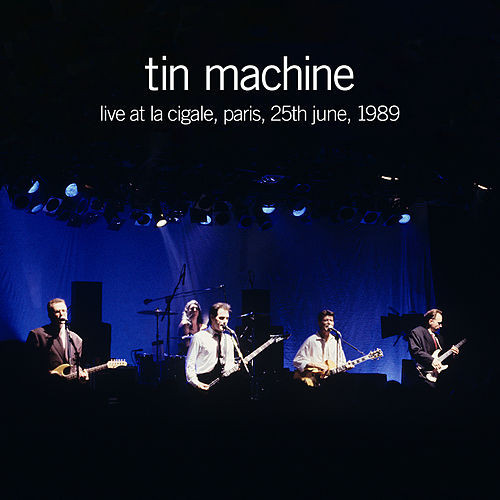
Tin Machine - Live at La Cigale, Paris
June 25th, 1989. Tin Machine set themselves up to be as musically combustible as possible from the start of their run. DB wanted to be thrown in the freezing cold pool to see what happens, and Reeves Gabrels provides all the controlled chaos of a tended-to forest fire, while the Sales brothers seem like the type of guys who played with fire before they could talk. So yeah, every time I play this record I have this sense that I need to find something to hang onto. I’m somewhat surprised this late (2019) Parlophone release didn’t get more attention - it got a wonderful thick mix from the truly great Tim Palmer. And while not “complete” (its about 1/2 the entire show) it is 45 minutes of simply blistering rock and roll.
The first four tracks here mirror the opening four tracks of the show. “Amazing” makes a great salvo because it’s sort of an unexpected tempo for an opener, but really beautifully done and the “life’s still a dream” line matches the languid musical molasses. Hunt’s drums sound absolutely fantastic, you’ll notice right away - and David’s vocal is super solid as usual - but holy smokes is Reeves Gabrels just sizzling all over this record. Scary good.
“Heaven’s In Here” is fierce - Bowie has a more cavernous vocal approach than on the studio album, and there are a couple times the band lets it all fall apart in a kind of particle-smashing soup, only to gather it all back up into a groove. What Hunt is doing with tempo under the buzzsaw Hendrixified guitars is pretty amazing, highly physical stuff. There is a physicality to all of Tin Machine really - from the wild videos, the shirtless dudes, the general frenetic approach to sound. There is a punk rock ethos crawling underneath the suited sophistication of Tin Machine that you really get a feel for in this live context.
The pounding Sacrifice Yourself is up next - an early B-side many don’t know, and then Working Class Hero - the Lennon song the band decided to do after hanging out with John’s 13yo son Sean during the Bahama phase of recording.
Bob Dylan’s Maggie’s Farm is up next, run through the Tin Machine, and comes out as you would expect. What follows is the remarkable Reeves Gabrels playground that is “I Can’t Read.” David openly loved this song, and it’s clear to me why. It’s profoundly unique, and was a song DB tinkered with for years, re-recording and playing with it like Play-Doh. Reeves and Kevin Armstrong have spoken about the spontaneous nature of its birth and recording process, and you can even feel that when its reinterpreted live on stage. When I listen to Reeve’s guitar parts here in Paris that night, I just think of aural poltergeists he summoned with ease and lets twist over the bobbing heads of the fans. Maybe its because he wrote it, but it feels totally inhabited by him. I’ve mentioned this before, but it’s very very difficult to find your own voice on such a ubiquitous instrument as the guitar, and Gabrels was already a monolithic example of that process in 1989.
“Baby Can Dance” is next and feels surprisingly dark in a way the studio version doesn’t fully explore. “Its OOOOOOVER now”
Closing with a killer “Under The God” and I’m thinking about how tight this band is, especially considering all the tempo fluctuations they navigate with ease. I’d argue thats not talked about as much as it could be. “Machine” isn’t just in their name and unified aesthetic, it’s *performed* that way. No infinite layers, buried parts, complication for complication’s sake. It’s a pretty pure blast of uncompromising rock. But I don’t mean “machine like” in its sound at all; more like each piece is necessary, balanced, important and used fully and efficiently - the only by-product being heat and the perspiration on my speaker cones. Turn it up.
0 notes
Text
*REVIEW*
David Bowie - Divine Symmetry (2022)
A Journey To Hunky Dory
The subtitle to this project is perfect, and listening through this 5+ hour set you really do get the sense of DB really going for something he's got fixed in his mind and heart - he just needs to shape and trim and mine all these great songs and find that final form. I tell you something - once you work through all this - all the roughness, the humor, the nervousness and charm; once you finally get to that 2021 new mix of Bewlay Brothers, with all its layers of complexity, intrigue and intricate skill, it's impossible not to marvel at the path he's cut through the jungle. It feels like a Fitzcarraldoian feat.
"After the struggle of The Man Who Sold The World, Hunky Dory was the album where I said yes, I understand what l've got to do now." - DB
The sequencing of this beautifully made box set is very well considered. The first CD is called "The songwriting demos plus" and it's filled with unheard and unreleased material - Haddon Hall demos with Bowie's new piano gift from the neighbor, hotel recordings in San Francisco to small groups of friends and journalists on the floor, DB jamming and improvising, and even scratchy acetate dubs that I cannot believe survived to even find their way here.
The second CD is "David Bowie and Friends" -
John Peel on the BBC, and it's a relatively nervous DB buoyed by his buddies and working out the kinks as Hunky Dory starts to take shape.
The third CD is more live work a few months later, also for the BBC; Sounds Of The 70's: Bob Harris, and then the previously well-booted Live Friars, Aylesbury from late September, '71 - all performed with new confidence and swagger.
The fourth CD is called "Alternative Mixes, singles and versions" the brings us up to the BOWPROMO mixes, all the singles, and the alternative new remixes of the final album stems.
The Blu-Ray ties it all together with the final and original mix of Hunky Dory - the 2015 remaster, in 96kHz/24bit stereo. Then the incredible Divine Symmetry version of Hunky Dory (no 5.1 DTS? boo!) - the new mix of Life On Mars in surround, and closing with the Bob Harris show in jaw-dropping quality.
So let’s get down in the weeds for anyone interested.
DISC ONE - The package opens with Tired Of My Life, a remarkable, mature and haunting composition that stands beautifully on its own, but will send the chills when you hear the chorus - recycled nearly a decade later in an entirely different context - you’ll immediately know it when you hear it. Such a fantastic choice to open with, clearly emphasizing the arching themes of Bowie’s career and the in-and-out-of-time patterns in his work. It’s interesting to me that this track and the similarly-toned Shadow Man hit the cutting room floor for a time. Make of that what you will.
How Lucky You Are follows and is a good example of the impact the piano had on DB’s compositions. It’s a nice song, and I was surprised to hear the bass and drums sounding so good for this kind of demo. The track speaks to his Brel Influences and pub hall sing-song wordless melodies he’ll continue to visit all through the glam years.
Speaking of Shadow Man, wow. Delivered at a faster tempo and a more traditionally earnest and direct fashion, it’s an arresting rear view mirror on the origins of this great song. When you hear it delivered like this it makes sense in the same soup with Quicksand and Bewlay Brothers. As I mentioned, it’s wild to me that DB needed this one to sit and marinate for awhile. I wasn’t fully aware how often DB did this until after he passed, but he always seemed comfortable leaving great songs alone to let their flavor develop until he felt it was their time to be interpreted properly. It’s like he knew the song didn’t have to seduce him, but that he needed to grow into the song and do the seducing himself to make it come alive.
And next up is a fun, very non-Arnold Corns version of Looking For A Friend that I had no idea existed. Just excellent hearing the bass so up front from Ian Ellis.
Also firmly in the “I can’t believe this exists” category is two recordings of David solo and his 12 string in a San Francisco hotel room *jamming* out a long version of Waiting For The Man - the only solo recording of it that exists - and complete with improvisations both vocally and on the guitar. Priceless. Honestly, not being a huge fan of this song and DB’s propensity to want to play it live, I think this is, in fact, my favorite version I’ve ever heard. And then the earliest recorded version we have of one of David’s finest compositions, Quicksand. Some octave differences in the vocal, but basically the version we all know. I’m reminded how grateful I am that sets like this exist if only to preserve this history. Not everyone will care to hear songs like this in their infancy, recorded on basic tape recorders, or they’ll consider it a one-and-done curio to listen to and move on, but it’s worth considering this work from a legacy perspective. Find, clean, present and preserve. It matters. I still can’t get over how young DB was writing songs like this. Extraordinary.
Next up is the incredible King Of The City, solo David in the front room of Haddon Hall. Overdubbing himself on guitar and vocals - backing and doubling himself - working the two tape machines bouncing back and forth between them as he adds new layers. Good Lord. There is a hint of early Motown soul here and it’s wonderfully confident. Finding his own way indeed.
Another David solo multitracked early version of Song For Bob Dylan with DB doing all the vocals, guitars and harmonica. Really nice. David sounds about 50 and playing his heart out for a bus ticket. Amazing.
Next up is a series of nice sounding demos recorded at Radio Luxembourg Studios in London. The relatively silly Right On Mother, a wonderful solo version of Quicksand, a very laid back almost lazy doobified preglam Queen Bitch, the always sincere Kooks, a one take solo recording of Amsterdam with David singing the second and third verses in a menacing lower register, and a super gentle version of Life On Mars, solo, with DB on piano, complete with charming clunkiness, mistakes, and endless charm.
Closing out the disc, another set of “how does this exist” tracks, Changes and Bombers recorded to - get this- 7” acetate - totally fragile, totally noisy and totally solo David on piano. Absolutely unfreaking believable and pure gold.
DISC TWO is mono and stereo presentations of the June 3rd, 1971 John Peel radio show. The band opens with Queen Bitch and Bombers, both haven’t yet found their exuberance; their *teeth* yet, and they lean toward timid and new. That’s not a criticism by the way - just part of the process. You notice an immediate change as they launch into The Supermen, Looking For A Friend, and Almost Grown - played clearly with more swagger and familiarity. Nice to hear nervous David introducing Kooks, and man, what a lovely version. The band is silent, and it’s just DB and his 12-string, singing this less from the upper nasal area, and more from his Letter To Hermione/God Knows I’m Good area of the throat. Really surprised me and sounds perfect in mono.
From here on out it’s a full band affair, multiple vocalists joining in; George Underwood, Dana Gillespie, Geoff MacCormack and Mark Pritchett all taking the lead at various times during Song For Bob Dylan, Andy Warhol and It Ain’t Easy. Other than Kooks, I prefer the stereo to the mono mixes here, but nice to have them both from a legacy/preservation perspective. David’s introduction of his friend Dana before Andy Warhol is very sweet and pretty funny actually. It must warm her heart to hear it today. For what it’s worth, she *nails* her vocal, and it’s no surprise to read he wrote it specifically for her. Another welcome surprise in this box.
DISC THREE contains two more live sets - but both of these are performed after the official Hunky Dory sessions and the confidence of David and the band is palpable. Especially David’s vocals - he makes these songs now feel lived-in. He’s letting timbre and dynamics match the lyric, and everything sounds more effortless and natural. The meticulous craftsmanship is done and now it’s all heart.
Immediately blown away by the sound quality of the Bob Ross session. Apparently a start-the-tape-and-play singular take, David and Mick alone just kill it. The mic they used for David and Mick’s voices is excellent, Bowie’s piano playing has never sounded better, and the balances are just right the whole way through the show. Absolutely loving hearing Mick Ronson’s totally joyful bass playing on Kooks. He just skips all over this thing under David’s guitar - I couldn’t stop smiling. What a talent he was and a blessing for David at this time. The actual broadcast of this performance closed with the next track, a great version of Fill Your Heart, but this box set includes the unaired Amsterdam and Andy Warhol. A note here about Amsterdam: I know this track can be divisive for many fans, but I’d encourage those nonplussed by that track to try again with this performance. It’s solo David and it’s a pretty amazing rendition.
And now the Live Friars, Aylesbury late September show. It’s immediately electric feeling. By all accounts, DB wasn’t thrilled with the small handful of gigs he’d done in ‘71 and was doubting his ability to connect with audiences. It’s one of the reasons why he poured his energy into songwriting and recording. But this show feels and is pretty historic. It starts out acoustic and gradually builds the band behind him and you can absolutely feel him win over the crowd. The story he tells about his difficulties waking up in the morning and what his mother had to do to finally wake him up is appropriately Bowie-bizarre. And then after the encore, with the audience demanding more music, the band goes with Waiting For The Man, only to finish to find demand for *more* songs and DB is tapped out. Trying to tell the crowd they literally have no more songs to play, he had to literally tell them to shut up, and then politely explain that he’s done, spent, got nothing left, but would warmly welcome the chance to write new songs and come back to play them. Beautiful.
This presentation is a tricky piece of audio engineering skill, as the original 1/4” tape suffered from some mangling, bad tape splices, dropouts, etc. Preserving the integrity and continuity of the performance required some pretty wild work done and you will hear those moments. Rather than let them jump out and annoy, see them as puzzle pieces creatively cut and fitted to allow you to take in the whole picture of that moment in time. I can tell you with confidence that the work here is extraordinary.
DISC FOUR is all post HD sessions mixes and singles from the time, along with the 2021 new mixes of select tracks from the final album stems. The disc begins with the 6 track BOWPROMO LP 2022 remaster. These are early and different mixes than ended up on Hunky Dory made for a Gem not-for-sale record that had Bowie on the A-side and Dana Gillespie’s work on the B-side. Some feature entirely different vocals and soundstaging. I suppose many might not hear the differences but they are there. Queen Bitch is wonderfully unhinged in this mix, Kooks’s bass line and strings really stand out nicely, Eight Line Poem’s new vocal, Quicksand has some alternate guitar parts, and Bombers/Andy Warhol Intro (which didn’t make the cut for Hunky Dory) sounds fantastic with that cleanly defined bass and piano. The book also notes pitch and tempo corrections for Kooks and Quicksand. I suspect there are some who don’t know these are different versions and they’ll be pleasantly surprised to hear them.
Lightning Frightening surprised me here, as I am familiar with it only from the mono bonus track on the Ryko 1990 CD of TMWSTW. Here, for the first time is the full-on chugging, twangy, down-and-dirty stereo version. Holy hell. You’ve never heard it like this. Herbie Flowers on bass, Barry Morgan drums, Mark Pritchett guitar, and David blowing lots of sax and harmonica.
Amsterdam was originally set to close Hunky Dory but was bumped for The Bewlay Brothers. It was also set to close side A of Ziggy Stardust on the first pass master tape and was dropped there too - getting it’s first official release as the B-side to the Pin Ups single “Sorrow.” This first early mix is David solo with a one-pass vocal performance and triple layered 12-string guitars. Whoa. The second mix here later on the disc is the mix used for the Sorrow B-side - the 2015 remaster from the Five Years box. Changes mono single, also from the Five Years box. And then holy smokes my favorite version of Andy Warhol I’ve ever heard. I’ve always loved the mono version of this track, and here it gets a new 2022 remaster. This is a turn-it-up-to-11 track for me. Fantastic.
Next up is the wonderful stripped back 2016 Ken Scott mix of Life On Mars made for inclusion on the David Bowie - Legacy compilation album. Most of you would have heard this, but what I didn’t know was that David and Ken discussed making this new mix as far back as 1998. During this same session on April 12, 2016, the surround sound mix was completed at Abbey Road and appears on the final Blu-Ray disc in the set.
Closing up disc 4 are the new 2021 mixes - so excited to finally wrap my ears around them. For Changes, Ken is working from the masters, take number eight here, and he notes that he heard many unheard/unused parts on that take that he wanted to bring up in the mix, including a new sax solo from David. His aim here was to give Changes a contemporary modern mix feel. Headphones recommended on all these new mixes, and if you are like me and have heard the originals countless times, you’ll notice much here to marvel at.
Life On Mars uses a blend of take 5 and take 9 and allows Ken to rebuild LOM in a way that he remembers the band absolutely *loving* but had to ultimately discard due to Mick Ronson’s cursing. He explains the story in the book and I’ll leave it to you to read and hear, but wow. What a song. This mix is faithful to the original and awesome.
This version of Quicksand. Wow. Incredibly, Ken states this take four version from very early in the HD sessions was determined to be “not good enough” but on revisiting, keyed in on David’s amazing vocal. And gosh it’s really something. He approaches it from a different place - hard to describe - but his timbre and annunciation feels genuinely weary and earnest. Always with these deep dive box sets, there is something that just makes you totally miss the guy, and this was it for me. What a humble performance.
Fill Your Heart is another big surprise - this is take ten but Ken had nothing else to work with as they’d simply recorded over previous takes to save on expensive tape costs. Again keying into David’s vocal, he wipes the orchestra out completely, leaving only Rick Wakemen’s stunning piano playing and DB’s alto and tenor sax. What this does is elevate and lay bare Bowie’s animated vocal parts draped right over your ear drums. Jaw on the floor.
Bombers gets a new mix! Another big surprise. Ken writes that he knows he did a mix of this for the BowPromo EP but can’t remember recording it or mixing it - so after 50 years, loved the challenge of sitting down with these master tape stems and getting to work nailing a mix of this unique DB composition. The song was dropped from the album because it didn’t “fit” with the other material, and although unstated in the notes, to my ear anyway, Mr. Scott brings it into the Hunky Dory universe with want he chooses to emphasize and de-emphasize. I appreciate his sensitivity to honoring the time and circumstances of its recording not going wild with it. It’s solid, balanced and fits beautifully into HD. I wish David could have heard it.
Ahhh man. Wow. People often pick my brain about “favorites” and “rankings” and such things that I generally avoid when thinking about art - and one of those questions is about what I think is “underrated.” There are certainly more than a handful of tracks that would qualify, and Song For Bob Dylan would be there I think, as I listen to this wonderful new mix. I’m not sure why many seem to see this track as a throw-away of sorts - I’ve met people that assumed DB didn’t even write it - maybe it just gets lost inside an album of outstanding tracks, but I think this version here could really grab some hearts.
…and the closing track. I admit I was pretty floored and superglued to my headphones when the new mix of The Bewlay Brothers began. Immediately I realized I had not heard this track at all, in any form, over the course of this box set. Reading Ken’s notes for this song, that’s probably because David just rolled up to him late in the sessions with the old “I have this new song I’d like to do” and f*cking genius that he is, just drops this atomic bomb of a track. So it doesn’t appear that it was demoed at all - which to me is just extraordinary because it *sounds* like a track that would have a deep life of growth, revision, alteration and struggle to find its final form. But no, apparently lightening struck, and in what will prove to be a pattern in David Bowie’s recording career, time and pressure forge a diamond that seems to arrive on a flaming chariot. I could probably blab for an hour about everything happening here, and the contrast to the original mix, but perhaps it’s best to just let that go and urge a listen. I will say the tendency to simplify is probably not always the go-to choice for an audio engineer when faced with rebuilding a complex emotional track like this, but Ken has managed to actually enhance the song’s Mariana Trench of mystery through distillation and careful consideration of each and every detail. Listening through this masterpiece after all that came before, you really do understand the subtitle of this set - “A Journey To Hunky Dory.” This is such a complex and pivotal year in David’s career. He was not glowing in confidence, he was haunted by possible one hit wonder relegation (Space Oddity) as his friend Marc Bolan was basking in well-deserved attention, TMWSTW was not selling well, he was embracing and fast-learning new instruments to compose on, and reconsidering all his possible paths he could take in his life. Things were not, actually, very Hunky Dory at all. I was struck by how, in the very cool included “student note book” containing DB’s hand written notes, lyrics, scribbles, chords, pay rates and telephone numbers, how David fretted over the spelling of the album’s title. Two “R’s?” Maybe with a “e” in there? Umm yes. No? Ugh. Hunky Dory is the story of a man both lost and found.
This is too long so I won’t get too into the weeds of the Blu-Ray disc as it essentially contains higher res versions of what we’ve heard before. A super high resolution of the original mix of Hunky Dory - the final “Divine Symmetry” mix and sequence of the 2021 version, the killer sounding Bob Harris set (also at 96kHz/24 bit stereo) and the 5.1 surround presentation of Life On Mars.
For those wondering, yes the price is high, but the quality of *everything* here is top shelf. The whole package is amazing. Essays, notes, photography, paper stock, slipcase, audio quality… really can’t be improved on. Disappointments for me are few - but the glaring one is the lack of the 2021 mix in DTS-HD or Dolby Atmos surround sound. What a waste not to take the time to do that for the Blu-Ray disc. That said, I’m still 100% happy.
This is a deep dive. If you are one of those people that get annoyed at repeated tracks over the course of multiple discs and can’t hear the difference anyway, or even care, this set is not something you’d want to dump money into. Streaming for free to sate your curiosity will do the trick while you keep your money in the bank.
But if you enjoy unheard/demo Bowie in pretty astounding quality and quantity, have a particular fascination with this record and it’s evolution, or even just enjoy curling up with a coffee table quality book to read and admire unseen photography, you won’t be disappointed.
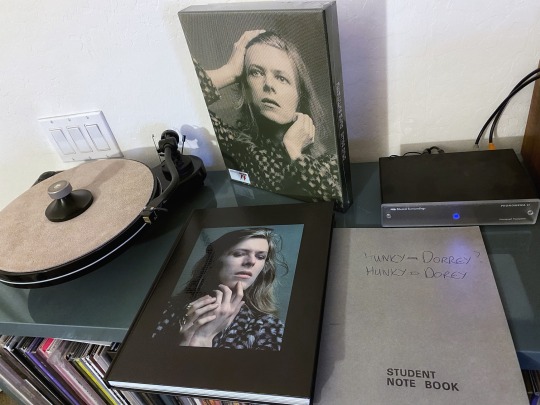
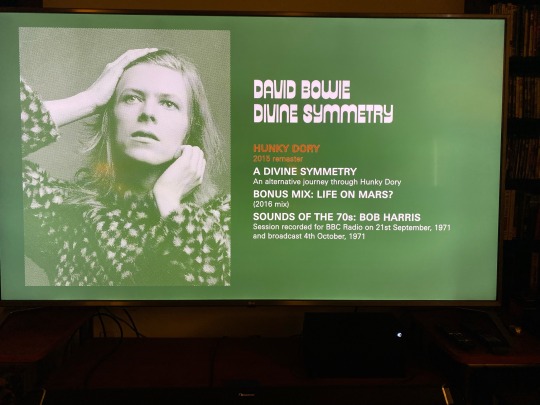
2 notes
·
View notes
Text
David Bowie - The Next Day (2013)
The Next Day was written, recorded and mixed in secret - an idea Bowie had tossed around for some time and apparently attempted at one point - but was completely successful here. Nothing leaked, and when word about the album hit, it was big news in the music world.
The Next Day opening track of the same name is a tight, deceptively nasty bit of gut punch rock where Bowie affects a variety of vocal timbres from withering angry old dude, to Tin Machine guttural gruff, to almost punk-rock nasal crescendos. As you listen, you realize that gut-punch was just an appetizer for the lyrical uppercut about to break your jaw. This track and accompanying video is without question one of db’s most controversial and provocative works. It’s seriously dark, and the more you dig into the symbolism in the video and the biting lyrics, the blows, especially towards the Catholic Church, become collectively devastating. Within two hours of the video’s release YouTube yanked it, and quickly former Archbishops, Catholic League websites, and a whole cast of characters assembled to safeguard the church’s media image and went into full Bowie attack mode. What was wild to me about the whole uproar was how naturally the actual content of the song and video was totally ignored and instead they attacked “bisexuality” and his age “he’s a has-been” “desperate” “senior citizen” - things of that silly nature. Once again db had hit the target hard, with depth and history and clarity and undeniable skill - and they had nothing to return but personal attacks and pompous irrelevant declarations. I remember marveling at the time how Bowie seemed bulletproof, but as the whole thing flamed out pretty quickly, I realized that it wasn’t so much that he was bulletproof, but that he was just *right* - and that’s a very solid foundation to launch art that challenges people.
Dirty Boys is such a wild contrast to what we’ve just heard. It strikes me like The London Boys’ evil twin. Steve Elson’s baritone sax is amazing, as is Earl Slick’s completely sleaze-ball 50’s stripper guitar work. Fantastic. Packed with obscure references that will continue to be a theme of this entire record.
With The Stars Are Out Tonight db taps into his Dylan side with his melodic choices and timbre and puts out a db classic. I’ve always been drawn to songs where Bowie limits his melodic range - it feels like he does this to elevate the lyric - but perhaps it’s unconscious, or just something that strikes me personally. Whatever it is, it’s effective. I believe this track was the second single from the record, and cranking this one up in the car in sunny California, super hyped that a new Bowie record is on the horizon, is a great memory for me. This track contains a lyric sequence that hit hard for some reason and I’ve never forgotten it since I first heard the track:
“Here they are upon the stairs
Sexless and unaroused
They are stars, they’re dying for you
But I hope they live forever”
Love Is Lost is immediately arresting with that defiant organ and that unmissable drum sound that zooms me right back to Low. It’s not the same effect, but Tony Visconti might as well sign it. Bowie is credited as the sole keyboard player on this track, and this performance of his is like some sort of mad church woman who just found out her husband was cheating with the church secretary right before she had to take her seat on the organ bench and is damn well going to let you know she’s pissed off (oh what have you done. Oh what have you done.) It’s not flowery or grand; just this shy of shrill, but not. It’s just enough to let you know something is wrong here. It’s a unique decision and performance from db and coupled with that particular in-your-face drum sound, just rivets me to my chair. Gail Ann growls her bass underneath it all too like a staggering phantom, drunk and lurching, and that sax punching through has a simple sass about it that just sells the entire vibe. Check out those amazing background vocals that show up like spectres toward the back end of the track. Wow.
Like many of you, I distinctly remember when Where Are We Now? hit the airwaves. I was perfectly comfortable with what I saw as a happily retired David Bowie the morning I got a call from a friend while I was getting ready for work. She hadn’t yet heard the song, but gave me the “OMG have you heard what’s coming today?” call and the radio station that had announced the time they were going to play it - right at the time I would be heading down the I-10 freeway on my way to work. Cool!
It’s effect on me was profound, I think for a number of reasons, some of which I probably couldn’t articulate well. But firstly, it just was not at all what I expected. I mean, I can’t even tell you exactly what I *was* expecting, but not that.
And I think that’s probably why it struck so hard, right in the chest. It was just a magnificently thrown curve ball for a “single” to hear on the radio. So absolutely and categorically different from anything on the radio at that time, and it just felt like the world stopped for a second as he served up something to really *listen* to. It cut through the popsoup of the radio, the noise of traffic, the noise in my head and heart.
So many obviously personal references that it felt truly left-field; like something only he could make work. And then of course the song itself. Bowie again allowing his pitch to just gently waiver with humanity and the weight of time and experience that earns you the pass not to fret too much over precision - only to then reach and connect so solidly on a note… a word… so absolutely perfectly that it’s completely at odds with how effortless it actually sounds. Just remarkable. It was part of a string of many musical moments in my life that shake me by the shoulders and remind me how much I love this art form. Bowie’s authorship of so many of those moments is why I hold him in such high esteem. It’s that simple. Listening to this song today is as devastating as anything on Blackstar. Shout out to Tony Levin for the wonderfully tasteful bass part and Henry Hey on piano, who an impressed David asked to be musical director for his Lazarus project some years later.
Valentine’s Day pulled a fake on me, big time. It’s sunny nature, my penchant for not always paying much attention to lyrics, and simply not immediately grasping that Valentine is the guys name, had me missing the anger and frustration inside this song. Until I saw the video for the track, with Bowie’s gradual fury, and the obvious evisceration of the NRA and the deification of guns and violence in my country, framed around the plague of mass shootings and child death. This video didn’t provoke an uproar like the video for The Next Day - probably because it’s just too subtle - the parody of NRA poster boy Charlton “cold dead hands” Heston, the very subtle bullet flying out of the coiled guitar string, Bowie’s dark attempts to empathize with the protagonist to make a point, db aiming his headless guitar directly at the viewer, that same guitar casting AR-15 shadows on the wall… you’d think it would be explosive, especially in America - where you can order up a Happy Meal of “I’m Offended” at any corner drive-thru restaurant - but it largely just sailed right on by. It’s a lot to take in, but at its core, Valentine’s Day is an amazing composition and shows db to be as comfortably subversive as ever. I wonder if Bowie was surprised the track didn’t ignite controversy like The Next Day did.
If You Could See Me is a solidly experimental composition that heralds aspects of Sue (In A Season Of Crime) and fucks with time signatures and rhythms in a way not often heard spilling out of DB’s head. Gail Ann Dorsey is lightning hot on the fretless bass - another instrument not often heard on Bowie records - and with her incredible background vocals and unison singing. Typically the bass and drums are mixed as a sort of unifying force - the “rhythm section” as it were - but here there is a disconnect between the very melodic soaring and sliding Gail Ann Dorsey and the backfiring, sputtering and tripping forward diesel truck engine that is Zach Alford. It’s another example of Tony Visconti’s skill at the mixing board. The way both instruments are mixed never really lets them “lock” and you are left with this sort of disembodied forward motion that seems to be simultaneously running ahead, but desperately trying to catch up. Just extraordinary audio engineering.
Bowie is inhabiting another dark character here:
“I will take your lands and all that lays beneath
The dust of cold flowers, prison of dark of ashes
I will slaughter your kind who descend from belief
I am the spirit of greed, a lord of theft
I'll burn all your books and the problems they make“
The “if you can see me, I can see you” lyric strikes me as a prescient nod to the populist authoritarianism gripping the United States right now and surging elsewhere. This move away from actual leadership, compromise and pursuit of the common good, towards the realization that if I’m in your face and in your feed and in your news constantly and relentlessly, then I have the power and little else matters at that point. Truth, becomes malleable. It becomes a shape-shifter and Bowie seems to instinctively recognize the power of shapeshifting ideas and personas and incorporates them here as he’s done since his earliest days as a songwriter. This is a take-me-or-leave me composition and is endlessly fascinating to me each and every time I hear it.
I’d Rather Be High, similar to Valentine’s Day, casts the dark shadow of death-dealing teenagers under a veneer of shimmering musical beauty and intricacy. This time focused on the cost of war and the people we employ to actually dole out that death in our stead. Packed with literary and film references as well as nods to other tracks on the album, The Next Day is shaping up to be one of the most musically and lyrically complex of David Bowie’s career.
Boss Of Me is a co-write with guitarist Gerry Leonard and brings back Steve Elson’s baritone sax heard previously on two A-side tracks, and also Visconti on recorder which makes me smile and think of DB’s earliest work. Tony Levin is particularly badass using his Chapman Stick on this track - his parts are so precise and funky and I love how they let his fingertips sliding over the strings stay up so high in the mix. It gives texture and grit and character to the low end. I also love Steve Elson’s baritone sax trills. Listen for them! After the granite-heavy lyrics of the first half of the record, this sequence of Boss Of Me/Dancing Out In Space/ eases up off the gas a bit and I’ve read criticism of that, but I think in the context of the whole album it’s a wise move, and sets the stage for the albums final and seriously dark act.
Dancing Out In Space is infused with Iggy Pop and Motown DNA in that drum beat and pedestrian melody - David Torn’s almost bagpipes-like guitar part is the highlight for me. Another happy-on-the-surface Bowie track that lends itself to deeper interpretations if you follow it’s literary references.
How Does The Grass Grow is an interesting track as it has a very hipswinging groove but also dips heavily in his glam past. Again, db is varying up his vocal timbres wildly in one single song; something he didn’t do all that often in his early to mid-career but feels freer to do in the latter third. Three distinct and different vocal deliveries - one for verses, one for choruses and one for the gorgeous bridge. Not many singers can pull that off as well as he does. The guitars are excellent here, David Torn’s parts are marvelous. Visconti has stated that Lodger was a blueprint for The Next Day - check out the Boys Keep Swinging nod in the fade. Again we have dark concepts slipped in under a glossy cover - hints of war and death and tragedy.
Set The World On Fire features the hard hitting Sterling Campbell on drums instead of Zach and Tony Visconti on bass and this rhythm section has such a different feel than the Zach/GAD duo. It’s a nice change-up and has a bit of a 80’s rock Bowie feel about it.
You Feel So Lonely You Could Die is another example of songs that hit me differently now that the man had passed on. It draws heavily from his past, namely Rock and Roll Suicide, and the Five Years quote from the drums at the end says a lot. But this is again a very deceptive track - love song on its shimmery surface, but dive in and find a truly menacing, cold and suffocating environment to explore. Blood, guns, assassins, obsession, sexual jealousy, betrayal and vengeance. “Death alone shall love you.” Absolutely bleak, absolutely memorable.
Heat is just a mystery of a song. It has the kind of somber majesty that many db album closers have - it feels connected to Bring Me The Disco King only drained completely of even the minutest hint of jazz and improv. Heavy stuff. It still feels impenetrable to me and that’s ok. Fans of Scott Walker (as Bowie was, big time) will immediately recognize his major influence over so many aspects of this track - especially if you are familiar with his late stage trilogy of Tilt/The Drift/Bish Bosch. Even more than “influence,” I’d go so far as to call it a homage in the best possible sense. Now that db’s entire output is in the rear view mirror, “Heat” (like so many Bowie album closers) points like a laser to Blackstar.
The Next Day is such a heavy, confident record, and one of his most lyrically potent. At times disarmingly direct, and other times deliriously mysterious and labyrinthine. One thing I noticed as I was reading interviews about TND and getting some technical specs about it’s creation, was the pretty wide gap between when the music was recorded and when the lyrics/vocals were recorded - in some cases, like a year later. Was db spending that time fleshing out the literary references and refining his message? Was he honing his melodies, shaping the vowels and consonants; letting that help dictate where his lyrics would go? Visconti says that once he was ready to sing onto tape, he’d show up and nail it all down quickly in typical Bowie fashion, and these are some of the most complex lyrics he’d written since his late 60’s early 70’s opuses. The Next Day feels meticulous to me, moreso than usual, and the wide cast of players speaks to a real sense of design and measured execution. These sessions would prove to be fertile as well as The Next Day Extra would soon show, and those extra tracks and extremely well-done remixes gave the impression of an impassioned statesman, unafraid to court controversy and with an overall sense of the Clock, ticking. As far as I know, he’d not yet received his diagnosis, but in retrospect the themes of this record and it’s drive and tensions are nonetheless poignant.
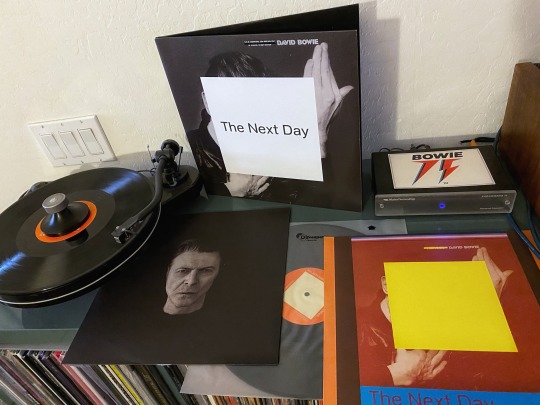
1 note
·
View note
Text
David Bowie - Who Likes Pixies and Elves? Gnomes? Vol 1 & 2 (2016)
Wembley Arena 2003
4LP set from the Reality Tour, recorded just a few days after the official Reality Tour triple LP/DVD release from Dublin. Modest quality, as audience recordings tend to go - not much definition in the instruments and overly boomy - but nice if your focus is the vocal. The main draw for me for both volumes is that it contains tracks that the official triple LP Dublin release doesn’t - namely, Fashion, Starman, She’ll Drive The Big Car, The Jean Genie, White Light/White Heat, and Suffragette City. Non-essential but a nice companion to the wonderful sounding officials.
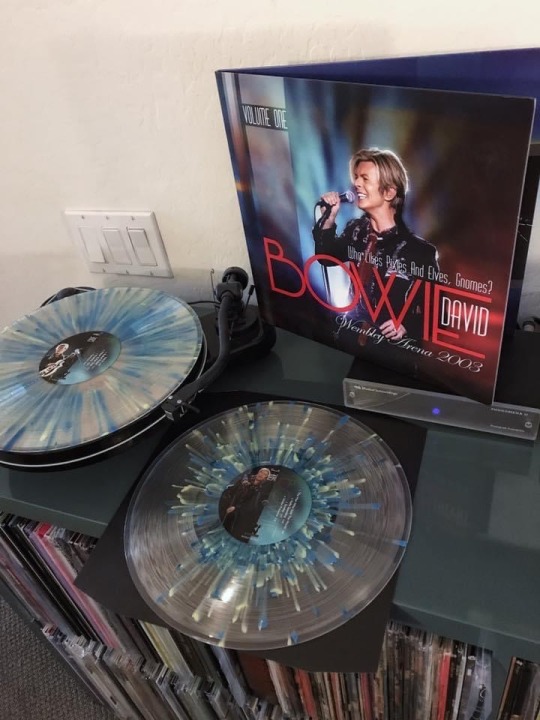
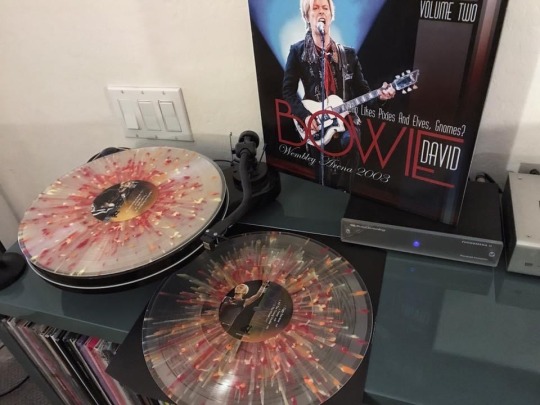
2 notes
·
View notes
Text
David Bowie - Jesus On Dateline (2016)
Nassau, Bahamas 12/20/03
AOL Bowie Session 09/23/03
Solid quality Bureau Supply release as usual for folks that enjoy spinning vinyl. Based on DB’s stage comments and the sound quality, I believe this is a live FM radio broadcast capture and it sounds pretty good. Midrange and guitar heavy, it’s great for really getting a grip on what Earl and Gerry are doing on the guitars, and DB’s vocals are clear and nicely balanced. The Reality tracks all feel dialed in and up a notch - Cactus rocks - and I love DB’s vocal delivery on Ashes To Ashes and TMWSTW. Absolutely *love* the arrangement of I’m Afraid Of Americans - especially the guitars and drums. Just a growling, swirling mess of anger that hits home for me particularly now, as I sit back and marvel at this seemingly inescapable swamp we’ve let fester and percolate in my country. Interesting how DB says “same story, different side” right after and then launches into “Heroes.” Whew. Yeah. Beautiful transition into “Sunday”
“Seek only love.”
So the D-side to this set contains the 5 tracks from Bowie’s AOL session (remember AOL?) and I’m really happy with how well they are recorded. Really nice surprise - New Killer Star/I’m Afraid Of Americans/Rebel Rebel/Fall Dog Bombs The Moon/Days - and Bowie and band sound super sharp. The acoustic, relaxed renditions of Fall Dog and Days are sweet.
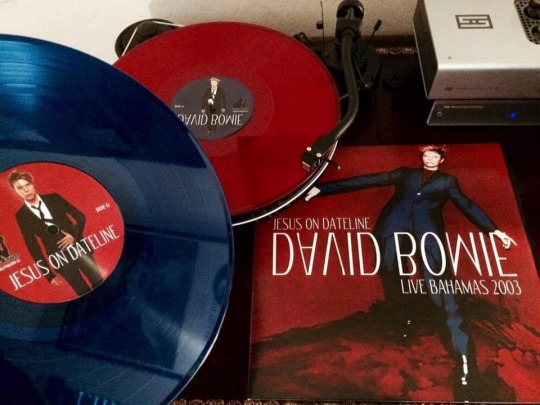
0 notes
Text
David Bowie - Reality (2003)
“The thing, probably, that keeps me writing is this awful feeling that there are no absolutes. That there is no truth. That we are, as I’ve been thinking for so many years now, fully in the swirl of chaos theory.” DB, 2003
I always learn new things about David Bowie whenever I listen through his complete discography chronologically, and this run through is no different. As I get close to the end here, I’m reminded how much less I know about these later works, due simply to the fact that they have existed for a much shorter time, and my experience with them is more limited. “Reality” rocks more than I realized on release day, especially coming off the heels of “Heathen” with all its layers and mystery and subtleties. An empty house afforded the opportunity to really crank this one up, a vinyl pass, and CD pass, and finally the 5.1 surround sound edition - and yeah - DB said he wanted a simpler sound, and wanted a record that could be translated into a live show easily and effectively and he got that in spades.
As with all his post-80’s work, and especially his post-heart attack material, “Reality” embraces the darker and more cynical side of DB’s many characters - from the irony of the album title with album art portraying a very cartoony space-man Bowie looking about as unreal and non-Reality as possible and still be recognizable - to DB’s insistence that he made a “positive!” record despite themes of aging and death, loneliness and anonymity, geopolitical strife, day-in-day-out mundanity and the creeping threat of urbanization to nature. Regarding the subject matter of Reality he told Interview Magazine, “This is probably a period when, more than any other time, the idea that our absolutes are disintegrating is manifest in real terms. Truths that we always thought we could stand by are crumbling before our eyes. It really is quite traumatic.”
I read quotes like that and I think, for a guy that is largely known for (and criticized for) his ability to synthesize the past and his surroundings into something entirely David-Bowieingly unique, he certainly shows skill at synthesizing the future as well. Beyond things like financial chicanery like Bowie Bonds and the impact of the internet on the creation and distribution of music, Bowie often hit at the very essence of what unites as well as divides.
The seeds of this malleablity of truth that DB describes had been planted in my country during the civil rights movement and the tragedy of the Vietnam War, but began to flower and bloom after the 9/11 event - affecting Bowie’s home turf and his family profoundly. Heathen is prescient, Reality is a little angry about things. DB took time to specifically say what Reality was not: it was not an angry album, it was not a response to 9/11, it was not his “New York Album” - but then he’d spend just as much time gently walking back those claims, almost wondering aloud if it was, in fact, all of those things and more. He speaks around this time about how naturally writing music came to him. Unforced, calmly. I think this “flow” is why you can glean so many little contradictions about Reality and it’s intentions and meaning. He’s letting it happen, not dictating the plot; the tensions of that city and that moment in time allowed to mold and shape the work. Polar opposite to the Heathen recording environment at Allaire Studios in the Catskill Mountains, Reality was recorded in the cramped Studio B of Philip Glass’s Looking Glass Studios in NYC and both those disparate studio choices impact their respective products acutely.
Reality is Bowie’s most “hands-on” record since Diamond Dogs, employing all his multi-instrumentalist abilities, and it’s also one of his most thoroughly demoed. Most all of Reality was demoed out in Studio B by DB and Tony Visconti playing all the instruments, with Mario McNulty (the same engineer DB would later trust with the posthumous reimagining/re-recording of Never Let Me Down) as studio assistant. According to Tony, he had a feeling that many of these “demo tracks” would not ever actually be re-recorded, so they were laid down at a useable fidelity. Consequently, much of the demo material survived on the final album. The band brought in for final overdubs was chosen with the live show in mind specifically. This was a smaller, tighter unit of BowieLive veterans and by all accounts recording was smooth and productive.
New Killer Star opens the record, and is also Reality’s debut single (that contained one of his more surprising B-sides, Sigue Sigue Sputnik’s ‘Love Missle F1-11’) and is a spectacular Earl Slick led hazy, woozy guitar statement.
This is followed by The Modern Lovers - Pablo Picasso - recorded in 1972 but delayed until their 1976 debut. This track mimics the space occupied by the Pixies cover Cactus - the second track on Heathen - DB pulling tracks from his past that he enjoys and placing them where they give the record momentum. Quite a different interpretation if you have heard the original - DB took liberties with both the lyric and the arrangement and it’s a cool little track.
Never Get Old follows and addresses the common theme of time and aging in DB compositions…. (Cygnet Committee, Time, Hearts Filthy Lesson, Changes, Fantastic Voyage, and many more) and the composition itself references much of his past in Space Oddities countdown, the elongated guitar strands of Heroes, bits of melody from Crack City, the four-walls-closing-in sense of Low and some of Hunky Dory’s ominous moments. A pounding live favorite.
…and seamlessly right into The Loneliest Guy. Anyone who saw the Reality Tour knows the captivating power of this piece, and it’s honesty and fragility was one of a few reasons why I thought this would be DB’s final album.
Looking For Water. Man, I *love* this song. It’s one of my favorite vocal performances on Reality and would certainly end up on my list of “underrated DB songs” were I compelled to make one. I like repetition in music, and it’s hypnotic and mantra-esque qualities - and this is one that always gets a significant volume boost.
She’ll Drive The Big Car - a supercool stab of Bowie sash and swagger, and a killer vocal performance, masking some seriously sad lyrics. Bowie manages to sound defiant, tired, funky, deferential, sexy and soulful all in the course of a single song. He’s such an effortlessly great singer, that’s it’s easy to become so accustomed to it that you almost miss it. It’s just “him.”
The exceedingly sweet “Days” fits nicely with all of Realities reflections, and has for me become a song I pay much more attention to since we lost the man to cancer.
Fall Dog Bombs The Moon is one of DB’s most overtly political songs, and was apparently written very quickly - under a half and hour - and directly addresses the Iraq War and the profiteering involved. Relatively bleak with murky lyrics, it’s a interesting and unique DB composition.
Try Some, Buy Some is just beautiful and I think one of Bowie’s most interesting and genuinely heart-felt covers (along with Waterloo Sunset, also from these sessions.) The inspiration to do this song comes directly from the 1971 Ronnie Spector version and the impact it had on him personally. DB seems to be absolutely sincere when he claimed that he had completely forgotten that it was a George Harrison composition until he sat down to work on the album credits.
Next up is the sizzling rocker Reality that has one foot in Tin Machine and one foot in The Next Day. Love Earl’s guitar sound here. Like New Killer Star, the guitar layers in this one sound amazing on the 5.1 surround mix.
Ahh yeah. Another in an amazing number of fantastic Bowie album closers. I’ve made it a point in my life to quit ranking art into “good/better/best/sucks categories and hierarchies and see art as an experience, not a competition. My friends know this about me, and consequently tease me and attempt to prod me into breaking this creed. Under unrelenting pressure to name a “favorite David Bowie track” I named Bring Me The Disco King.
I could give many reasons why this would be the one…. The repetition I mentioned earlier, here found in Matt Chamberlain’s drum loop (interestingly snagged from ‘When The Boys Come Marching Home,’) the overwhelming sense I had when I first heard it that this was DB’s final record, the sense that the threat of jazz that had always pounded on David’s door in his chord structures and harmonies had finally broken down the door… the very tangible sense that this was a composition that had already had a long life but stayed tucked into the shadows by its unsatisfied creator, only to be given life and light on this great album after it had been stripped down to almost nothing - simplicity being the sought after key to its finally being allowed to soar. If it’s not already obvious, I think this song is magnificent. Literally. The fact that David knew it was deep inside there, he just had to mine it out over the course of a decade or so is extraordinary.
Couple of thoughts about a track that didn’t fit well on Reality but made it to bonus/B-sides…
How cool is his cover of The Kinks Waterloo Sunset? In the years after his death, when I feel that loss in my heart, it’s Waterloo Sunset I turn up to 11 and allow it to yank me back out of that murk.
“People so busy
makes me feel dizzy
but I don’t feel afraid
as long as I gaze on Waterloo Sunset
I am in paradise.”
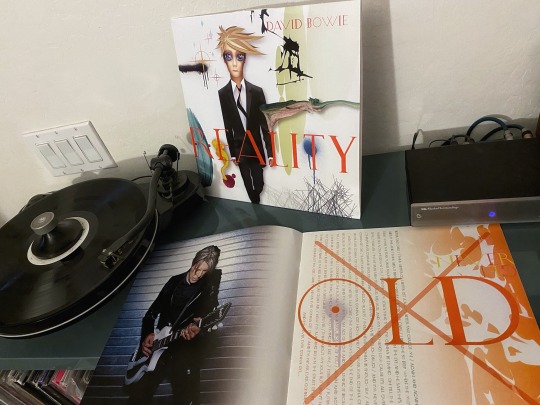
3 notes
·
View notes
Text
David Bowie - Montreux
Excellent 4 LP soundboard recording from the Heathen Tour at The Stravinski Auditorium on July 18th 2002 - his last European show before a break and onto America. It’s an interesting show for a number of reasons, one of which is that most of Heathen is performed, so you get to hear rarely performed songs - some I don’t think he ever performed again. And also because, as a second encore, the 1977 album “Low” is performed. That’s one hell of an encore and a tour I wish I could have seen, but it never came anywhere near me. CD boots of this have been floating around for awhile, and digital files easily available on the net - you can also view the entire show on YouTube (I’ll link to it below) but it’s cool to have such a nice sounding vinyl package from Bureau Supply, 2016.
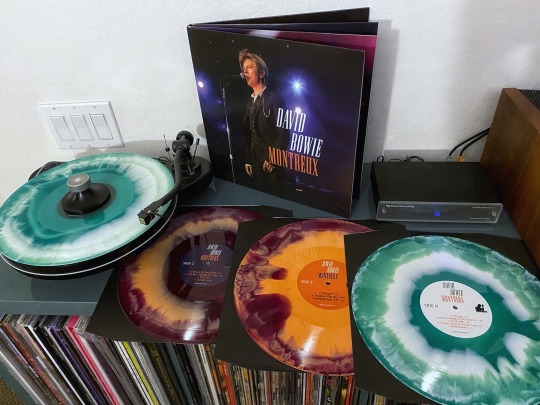
1 note
·
View note
Text
David Bowie - Heathen
“Heathenism is a state of mind. You can take it that I’m referring to one who does not see the world. He has no mental light. He destroys almost unwittingly. He cannot feel any Gods presence in his life. He is the 21st Century Man.” — DB
Hours... took a serious turn towards the personal and Heathen continues this trend you see right up to his final works before his death. There is undeniably a weight to this series of records that now carry the burden of the surprise of his private battle to stay alive - it's hard to separate now - just like it's hard to separate the 9/11 events from this record even though these songs were written prior to the event itself, it has woven itself into the fabric of the recording process and the performances. DB has always addressed his mortality long before he was even sick or had his heart attack, but the records from Hours on really start hammering at that nail and each one has a sort of sorrow draped over it for me that wasn't quite there before. I know much of that is my own filter, my own lens, and totally subjective (Blackstar being the obvious exception) but it's still inescapable for me.
Tony Visconti is back on board not only as producer but handling string arrangements, backing vocals, and much of the bass work. He referred to this record at the time as Bowie's best work, "his symphony," and it does have a wide sweeping scope and a sense of momentum and focus. I enjoyed this record very much when it came out, but like pretty much all of his post-Outside work it took time to really get under my skin, and some of Heathen required a steady dose to start to feel and understand the effects. There is plenty of impressive subtleties here and the fact that he wrote these tracks *prior* to the 9/11 event (listen to Heathen (The Rays) album closer) is as good an example of evidence as any that DB did in fact possess a fully functioning crystal ball.
Heathen has some notables that are worth mentioning I think. Bowie’s only recorded drum performance is here, the appropriately stiff backbone of Cactus by The Pixies, one of three excellent cover tunes - the other two being a menacing rendition of I’ve Been Waiting For You by Neil Young and I Took A Trip On A Gemini Spaceship by the Legendary Stardust Cowboy - the song that contains the lowest note DB has ever sung on an album (a cavernous G1)
To my ears, there are two major decisions that deeply impact the feel of Heathen; Tony Visconti’s return to the studio (since 1980’s Scary Monsters) and the jettisoning of Reeves Gabrels. More than anything else, those two things in tandem not only shake the tree, they practically cultivate an entirely new forest. With the shelving of Toy, all the looking back and reinterpretation of prior work, it’s no surprise TV was called in, and Heathen has hints and nods to all sorts of moments throughout DB’s entire career that are nicely crystallized by their reunion and shared experiences. And Gabrel’s absence is very obvious, even after his more muted and subtle performance on Hours... and the guitar styles across the whole record vary wildly. Contributions from Bowie himself, Visconti, David Torn, Carlos Alomar, Gerry Leonard, Mark Plati, Pete Townsend and Dave Grohl - so you move away from a pretty singular expression of that instrument (as explosive as it was) to a totally new palette of guitar sonics, and it has major impact.
All that sounds like it might add up to a complicated aural soup, but in fact, Heathen is a relatively simple record as far as instrumentation and arrangement goes, and that gives it much of its weight. It says what it needs to say pretty directly, to a no-nonsense world, from a 55 year old artist extremely comfortable with his craft. It’s a “grower” for some listeners, and was “insta-brilliant” for others; but whatever your initial impression, it’s hard now not to see Heathen as the achievement it is.
“I demand a better future.”

0 notes
Text
David Bowie - Glastonbury 2000
Focusing very specifically on the positive, opens oneself up to accusations of sycophancy, certainly on dedicated Bowie forums where deeply held opinions from an individual’s discerning ear are woven inextricably into any given personality. It’s something that feels unique to the art of music and sound; moreso than say painting or photography, and I think it speaks to the power of music’s ability to shape the very memories of our own lives and how we chose to live them.
This criticism of this particular show is fueled by DB’s insistence that it be truncated, the reason being a dissatisfaction with the vocal performance due to the singer recovering from an earlier laryngitis diagnosis. Other suggestions from people involved with that decision claim otherwise - that the quality of DB’s performance was never in doubt, and that it was a purely fiscal argument with the BBC having plans that differed significantly from the Bowie camp’s expectations.
Regardless, where others seem to hear a disaffectation from the material, or a boredom even, I hear humility. No doubt, DB’s connection to that place, and to the man he was in 1971 when he first took that stage, must be profound. I think that humility is immediately evident with not only the choice of opening such a huge show with Wild Is The Wind, but in the performance itself. It feels to me like he chose a song he himself did not write, a song that is the very castle-on-the-hill of the artistic expression of intimacy, and he makes an extremely public and passionate attempt to scale up that mountain, accepting the bumps and bruises and scrapes right there in the open. The heat of the spotlights juxtaposed with the visible exhalation of breath into the cold. One man, one huge crowd of fans and non-fans alike. A word on a wing.
Another criticism is the “let’s play the hits!” aspect which is obviously valid, and something DB himself wasn’t thrilled about, described by his writings in the 2020 Glastonbury CD/DVD/LP set liner notes. He recognized that many that purchase tickets for a festival like that, do so with no knowledge of who all the acts are and all their material, and he felt an obligation to do his best to try to be inclusive of all. So with a few exceptions (like the wonderful arrangement of Let’s Dance) these arrangements are what you’d expect from this particular band at this time, and the songs are recognizable and certainly sing-along-with-able.
I’m not going to track-by-track this 2 hour show extensively. I’m nauseatingly long-winded as it is, so I’ll just point out a few things that struck me about the show and the recording. Earl Slick and Mark Plati really sound great together. For as short a time as they had to put this together, it’s impressive how complimentary their dueling guitars are - especially when you consider that the lines between who plays rhythm and who plays lead are not clearly defined. They both handle those roles at different times and they sound great together.
Changes was a given here with its inclusion in the ‘71 set. Great guitar stuff happening here.
THAT rendition of Life On Mars after a laryngitis diagnosis? Come on now. Extraordinary.
Did you catch how DB casually mentions Absolute Beginners is his “favorite song of the 80’s?” and that he hopes some of them know it? Very cool inclusion. Some of the Kate Bushian background vocals are a bit weird here. They work technically, but I could do without them in the verses.
You can feel the band really settling in here on Ashes To Ashes. Gail’s bass arrangement is fantastic, and Sterling’s drumming is killer. I’ve always been perplexed as to what the steam-hissing sound is during the chorus. Still don’t know the what or why of that. Is Garson triggering a sample? It plays through the coda too.
I like this version of Rebel Rebel, and you can see DB totally feel the crowds reaction to it. Everybody is rocking out, Sterling is pounding the snare like a time-stretched jackhammer on resilient concrete, the backing vox are solid and Earl plays that riff like he’s landing his Cessna on an airstrip on his personal island villa.
Bowie breathless on Little Wonder after slaying Rebel Rebel. Hang in there Dave!
So yeah, I get the criticism of Golden Years. If you take DB at his word, that they hadn’t played it in forever and only worked a week - it shows. Firstly without very specific notes to the live sound guy about how to treat all these vocal trade-offs in the arrangements, it’s gonna be that dudes nightmare. Clearly some parts aren’t totally thought out… the harmonica sound is “there” but just…. there. Gail’s parts are poorly mixed. The sound guy is playing constant catch up. The guitars aren’t as complimentary as you’d want for a song whose groove is paramount.
And Fame wipes that all away in an instant. When I first saw Gail switch to a 5-string bass and drop into that groove… hot damn. DB sounds fantastic here. And Sterling’s stutter-step drumming is just badass. Solid as a rock. The band is having so much fun and you feel it from literally everyone on stage.
All The Young Dudes cranks up the ROCK feel of the show significantly at this point; a trajectory that apexes with a totally slamming version of Ziggy Stardust that I’ll get to later. Holly and Em’s backing vox here are great.
Slightly shaky start to TMWSTW but they pull it together fast. Plati’s acoustic is a nice addition to the shows timbre. Some nice interplay between Earl and Mike. Sterling Campbell again with some stellar drumming. I love that snare sound.
Mike Garson is strangely absent on Station To Station and there are balance problems with parts of the vocals, but overall serviceable. I tend to focus on Earl Slick’s growling guitar leaning into the left channel. He has such a snake-like delivery when he’s playing under the vocals. As I’ve mentioned, I love Sterling’s drumming, but I miss Dennis Davis on tracks like this. Cold grooves like this was in his blood.
“I feel love in this room. I do!”
Ahhh. I hear a lot of joy in this version of Starman. Mike’s rolling piano is beautiful. What a great song choice for this venue, and the crowd loved it.
“I’m hot and sweaty, I wore a stupid jacket, and I’m too vain to take it off.”
Wow. You can immediately tell that this band is more familiar with and has toured Hallo Spaceboy. Nice to see this toss to fans of his newer stuff. A potent slice of menace to balance out the childlike charm of Starman. DB’s voice showing some fatigue.
Under Pressure was a certainty for this show of course and Gail nails her difficult synchronous parts with grace as always. I think DB is aware his voice could go, and is making melodic, timbre and amplitude choices carefully to pace himself.
“…and goodnight…”
Well, I love this encore opener of Ziggy Stardust. Sterling sets the tempo smacking his sticks together and it’s a dirty, sloggy, whore in the alley tempo and Earl just feels it right up. Again, Sterling’s snare sound is a shotgun slug. Earl and Mark fully unified, and DB pushing his voice and laying it all out there. So great. For those of you that avoid this show as lackluster, decontextualize this track from the show itself and crank it up. It slams.
WhooBoy, yeah. DB is tired here. Heroes probably would have worked better as a show centerpiece, and with a fresher vocal, but I’m not in love with this pedestrian guitar arrangement. This song needs abandon. It needs desperation. This arrangement sounds a bit like they just want to get through it. Maybe that’s too harsh, but it’s easy to find better live versions. Like straight from 1977, Bowie lets his vocal fatigue/strain work in the songs favor.
So the first time I ever heard this show was on a cassette a friend made for me, a boot of the whole show, and I just assumed as I was listening that Heroes would close the show. And then… uhhh… Spanish guitar from Earl? eBow-like guitar swells from Mark? What am I hearing here? Ahh. Let’s Dance. Sweet! Love this arrangement. They’d done it this way before, but back then, I think it was the first time I’d heard it. Man. DB’s voice is hanging on for dear life.
Again, assuming LD would close the show. And…. I’m Afraid Of Americans! Great rendition. Excellent keyboard touches all through this thing and gives DB a chance to growl through it without any intense melodic acrobatics.
Well, there you have it. Your mileage may vary as they say. Unavailable in its complete form officially until only recently, it’s a fun huge-festival type listen. Are there “better” shows? Certainly. But I enjoyed the hell out of this DVD/CD edition as well as the Bureau Supply edition on vinyl. Next up: Heathen.
EDIT: That slaphappy bass part on Ashes To Ashes is played by Mark Plati - Gail switches to rhythm guitar. That’s what I get for writing instead of WATCHING.

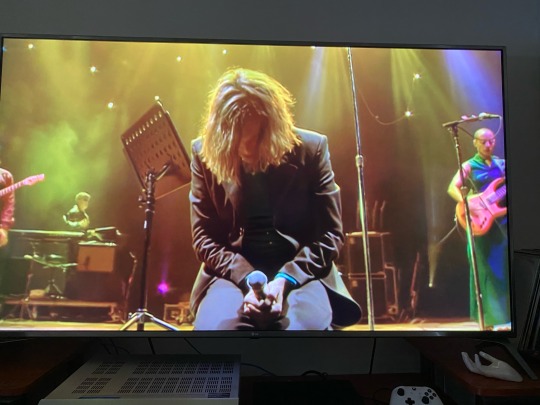
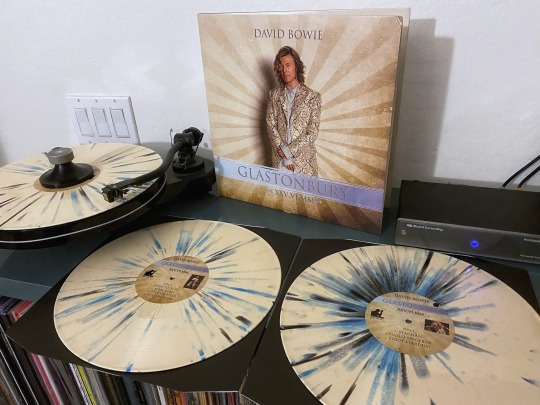
0 notes
Text
David Bowie - At The Kit Kat Klub (Live New York 99)
from the Brilliant Live Adventures box set
I’ve mentioned this before, but when this BLA project was announced, my initial thought was to wonder if there would be a “sameness” that could weave through the entire set. Different tours/albums, yes, but very similar band personnel with only some additions and subtractions in the drum/guitar/backing vox. Now with this 5 year period organized and so nicely produced, it’s actually surprising how pronounced the morphs of arrangement, approach, energy, and overall timbre actually are when you listen through the project. The only thing that seems relatively consistent is the quality of musicianship from all involved.
Side A has a nice suite-like progression from the stark Garson-only Life On Mars, to Thursday’s Child gently bringing in the band, to a wonderful Something In Air - a song that has shined more for me because of these live interpretations.
Side B begins with a sprightly and straight ahead rock rendition of China Girl, into a thumping and almost punk version of Can’t Help Thinking Of Me complete with exaggerated accent and Sterling’s pounding drums. This side closes with a show highlight for me, a contemplative and guitar-layered arrangement of Always Crashing In The Same Car. Weird side note: I always thought that Jasmine was “weeping” and I’ve always sung it that way, but Jasmine is clearly “peeping.” Hmmm. Food for thought.
Side C begins with a beautifully understated Survive, reminding me again how much the Hours material sometimes feels sharper, more natural and personal when performed live. Gone is the ‘97 arrangement of Stay and it’s back to a more traditional dual guitars setup, until… what? That brief funky section with Mike Garson doing his best Stevie Wonder keyboards impression is a trip. Ahhh… that’s a haunting Seven. You rarely hear David Bowie sing so…. casually. It’s nice. So much of Hours is delivered this way - as if he’s alone and singing into a mirror. I remember having that impression when Hours came out, and then eventually seeing the video for Thursday’s Child with yes, much of the video spent with David in a mirror, sometimes singing and sometimes letting the words continue on without him as he takes in his own aging face. I know one thing for sure: early 30’s me was not ready for Hours. Early 50’s me totally gets it.
Neat to hear the crowd sing along with Changes. These songs that us longtime fans have heard a thousand times, literally, and can often be understandably tired of, really are great songs even though it’s hard to hear them as they are without all our baggage. My young son *loves* Changes…. When he was around 5 he told me one time,
“David Bowie is not very smart.”
“Why do you think that Evan?”
“Well, he says ‘turn and face the train’ and that is not smart at all. David Bowie should tell you to run from the train. Also, trying to put out fires with gasoline is a really, really bad idea. I like David Bowie, but he has some bad ideas.”
I love Sterling’s drumming here on Pretty Things are Going To Hell. Another great live interpretation. Kit Kat closes with a growling I’m Afraid Of Americans which stands out to me because it’s the first time you’ve felt some real tension and atonality in an otherwise pretty placid and smooth show. I like this squelchy version with its space and upfront backing vocals.
For all the stress involved with the splotchy rollout of this box set, it’s a fantastic listen, and the fact that six mid-90’s DB shows would be this popular just blows me away. In contrast to how the internet feels sometimes with all its negativity towards art and artists and the commerce involved in getting that art into our ears, his music is still enjoyed beyond just the “hits,” and these fantastic documents of David Bowie the live performer are valuable and welcome by so many around the world.
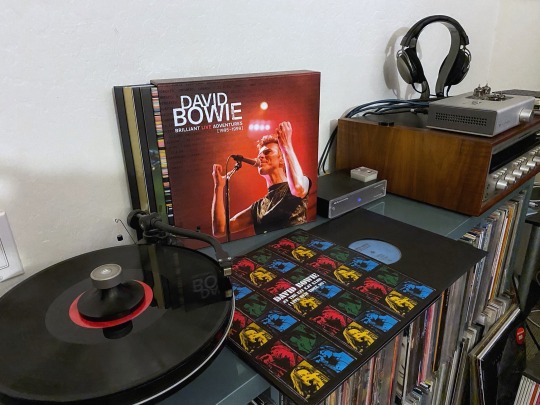
0 notes
Text
David Bowie - The Width Of A Circle (2021)
I’ve made no secret of the fact that I love these posthumous releases from the DB camp, realizing and recognizing they are infinitely ignorable to some, and exhilarating to hear for others. TWOAC, like Conversation Piece, is not casual fan stuff - which seems obvious, but some criticism it receives indicate some don’t realize that. Sound quality is the best it can be given the source material, but much of this project is best approached with a relaxed expectation of arresting sound quality; rather, an insight into the artist’s songwriting and performance abilities at that moment in time - at least for the first 2/3rds or so - after which the sound quality jumps significantly with the 2015 remasters and 2020 remixes.
But I’ve got a bone to pick with this particular release: Announced as a “companion” to Metrobolist, I find very little here that links it to that album or The Man Who Sold The World, besides it’s title. On the other hand, there is *plenty* that links it to David Bowie the ‘67 album (Karma Man, London Bye, Ta Ta, When I Live My Dream) and David Bowie the ‘69 album (God Knows I’m Good, An Occasional Dream, Janine, Wild Eyed Boy From Freecloud, Unwashed and Somewhat Slightly Dazed, Cygnet Commitee, Memory Of A Free Festival.)
In fact, if you consider the inclusion here of Amsterdam, Columbine, Harlequin, Threepenny Pierrot, and The Prettiest Star, this new release feels more like a “companion” to Conversation Piece than it does to Metrobolist/TMWSTW.
So clearly the link here is a link in time and not a link in theme. Even the tracks that should feel akin to Metrobolist like the four Andy Ferris tracks, lay out more like Ziggy era tracks with DB’s chosen upper throat delivery. It’s not until you get to the newest 2020 mixes at the end of the project that you feel the hovering mist of menace that impregnates TMWSTW/Metrobolist, so I guess I’m a little perplexed at the way this is marketed.
That all being said, it doesn’t mean I didn’t enjoy it. There is plenty here to love. Some of the BBC stuff you will recognize from various releases, some you won’t... this feels like a complete, straight through performance with all its ups and downs and mistakes and earnest honesty. It’s amazing to hear early versions of Fill Your Heart and The Prettiest Star - also those who never picked up the Five Years Box/Re:Call 1 will appreciate the 2015 remasters of Pt 1 and 2 of the single version of Memory Of A Free Festival and the kickass mono version of Holy Holy.
The highlights for me are all on the backend - the Sounds Of The 70’s: Andy Ferris stuff is amazing - that version of the Supermen is wonderfully sludgy and dark, as is that killer version of a normally take-it-or-leave-it Waiting For The Man. As anticipated, the Visconti remixes are killer, particularly in the drum department. The Prettiest Star is the prettiest version ever, with its passionate strings, songs of the sirens background vocals, music box bell chimes and reverb washes. The new mix of London Bye, Ta Ta was the biggest surprise to me: hammering pianos, guitar squalls, synthy-sounding-squelches, and very prominent female backing vocals delivered in a very orchestral fashion. I was also very impressed with this mix of Memory Of A Free Festival. Tony’s bass is active and bouncing, the guitars feel thick and strong, and it all builds beautifully to that crescendo finish. Great vocal treatment on DB at “Sun Machine.” And of course Holy Holy, which is one of the best new mixes TV has done so far on all this great raw material. Granted, it was never a mix that sounded much beyond utility, so the pump is primed - but I’ll be damned if this wasn’t another one of those mixes that seem made only for his friend David with the express intent of making him jump from his control room chair with joy.
The guitars are all nasty and sass and compliment DB’s vocal perfectly. The ooooooo’s and ahhhhhh’s in the background vocals are like synths filling out the space. Tony is showing off with those bass runs, but those drums! Good Lordy. Absolutely excellent drum mix there of military march coupled with a syncopated near-funk that just completely drives the track into new territory. Far and away the best version of an already pretty cool deep Bowie track from the time.
Ones enjoyment of this release is probably closely related to ones appreciation for DB’s songwriting and delivery at this point in his career - known, but not a superstar. Very creative, but not particularly polished or ultra-focused. I also could see some disappointment from devotees of The Man Who Sold The World that this isn’t the deep dive into that particular record that could be arguably implied.
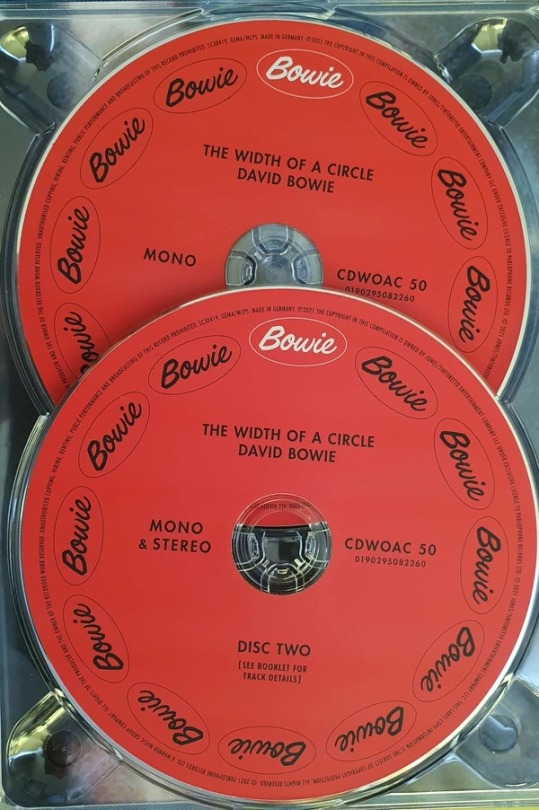
0 notes
Text
David Bowie - Something In The Air
from the Brilliant Live Adventures box set
The record opens with a wonderfully tender and reverently quiet rendition of Life On Mars. For a song that is so well known and has been heard and performed ad nauseam, I’m always surprised how Bowie can continue to mine a wealth of emotion and sense of the new and novel right out of it - this time, with his heart on a platter. I guess it’s as simple as a great composition combined with a great voice, but Bowie always makes it feel like more than just that classic combination.
Thursday’s Child & Something In The Air follow and are both very interesting vocally. They are delivered more full-throated and resonate than on their album counterparts and SITA has only hints of the vocal effect used on the Hours album version. Thursday’s Child has a bump of joy in it... the drums jump and there is a tiny bit more “swing” - overall, both interpretations are really nice.
Bowie wonders into the microphone why he placed all the “hard ones” to sing at the front end of the show, and then effortlessly glides through Word On A Wing like he’s singing while simultaneously making you a green bell pepper and sausage omelette that he’s sure you’ll love. DB’s vocals are so extraordinary here that it’s easy to miss how great the guitars are on this song... Mark Plati, Page Hamilton & Gail Dorsey play a wonderful arrangement.
After all that seriousness, Can’t Help Thinking About Me is just one big plucky smile and it works great - DB rocks it, adopts the accents, and Sterling Campbell delivers a fantastic drum performance. China Girl is uptempo and guitar chugging, stomping through a new arrangement with tinkling piano keys and breathy background vocals. The side closes with an almost unrecognizable Always Crashing In The Same Car. Far removed from the Low aesthetic, DB’s vocal is amazing and Sterling Campbell’s choice of rimshots in the verses and full snare in the choruses is perfect. What a treat to hear.
For me, the album’s centerpiece and soul is the lead-off second album track, Survive. He introduces it as a new song and after it’s over expresses his pleasure with the track and playing the new material live. Of course we now know how the Bowie story plays out, so it’s beyond potent to hear him sing these words.
Drive-in Saturday spins itself into a surprisingly thick soup for such a skeletal band, Changes is dutifully Hoursified and is so obviously a perfect fit for this show and this period of his career. Gail’s bass here is all precision. Seven is introduced as a “gentle” track and it’s delivered as such. Beautiful backing vocals - my favorite performance from Emm and Holly on the record, and Frippesque guitar lines make for a beautiful singsong and peaceful performance.
Repetition! Man. What a performance. I love how this track just drops a heaping pile of dissonance and oddity and ripples up an otherwise pretty placid and calm surface.
David’s “I’m just testing you” as he announces a Tin Machine song with typical self-deprecating humor and proceeds to play Width Of A Circle is classic DB. This floating and hovering torch-song version of I Can’t Read is a favorite, especially with those altered chord voicings in the chorus... exquisite. David always treated his old material as elastic and that takes a remarkable confidence in your foundational work to pull that off with as few failures as he had.
The Pretty Things Are Going To Hell is a nice and thick slab of rock and roll with Bowie in full Omikron vocal mode, set back in the mix and all sass and tude. Sterling Campbell again here with the drums. Damn. Check some of those drum fills... ridiculous. Rebel Rebel closes the show and works largely on its familiarity, but is always best when DB allows himself to have fun with it, and here he clearly is - sing a song 1000 times, you have to find the joy in there somewhere or just let go of that balloon.
Quick note on the pressing - excellent work from Air Mastering and Optimal Media GmbH. Clean, very low noise floor, dynamic. As usual.
So when this 6 album project was announced, I was a little worried about the potential “sameness” of it all... being that these are all from a relatively small range of time in DB’s career, but that’s proven not to be the case at all. Next up is Kit Kat Klub to close out the 1990’s and it’s on to Glastonbury, 2000
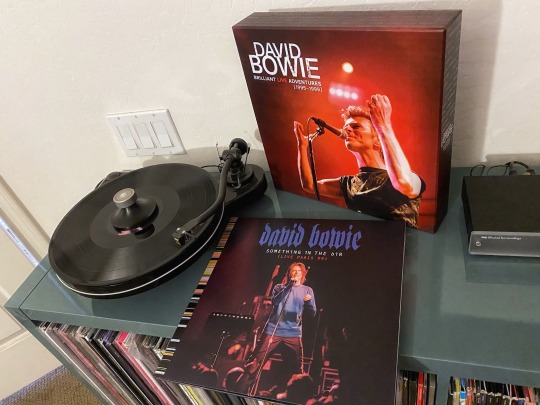
0 notes
Text
DAVID BOWIE - Hours... (1999)
Of all of his records, this one took the longest to click. At the time, I don't think I was at all ready for an elder Bowie to begin his reflections on his life. Outside, Earthling... there was a frenetic searching, digging deep happening... Hours just felt sleepy I guess? I didn't *dislike* it, but it just took time and my own grappling with aging for it to grab hold, and it sure did. And now with his passing, and how it happened, listening to "Survive" and "Dreaming My Life" and "Thursday's Child" "The Pretty Things Are Going To Hell" "The Dreamers" etc... Frankly, it can be as emotional as listening to Blackstar. It's not the record of a man in the emotional swirl of a cancer diagnosis, but it is the record of a man who understands change, embraces the unknown, and the human need to simply connect. To find something to value in the mess and confusion.
DB’s vocals on Hours are very interesting. Much of the round and resonate baritone is suppressed, and he’s singing from a more heady, upper-throat place that lends a vulnerability and introspection to the parts... almost as if he’s singing to himself into the mirror with no one listening. Then the video for Thursday’s Child drops and he’s doing essentially that. His vocal confidence in that song in particular to be slightly imprecise with his pitch to deliver a sort of world-weariness is just masterful. He keeps up this more delicate upper-voice through the entire first side of the record until the Side A closer, the brilliant “If I’m Dreaming My Life” and the introduction of his cavernous lower register is subtly powerful.
Shout out to Reeves Gabrels who scored a co-writing credit with Bowie for the entire album. His playing is incredibly tasteful and subdued (for him) and with every listen I'm more impressed with the layers of sound he's got back there. Really nice, and a must-hear for non-fans of his squalling and shearing guitar style. He reigns it in and delivers.
I have a very good friend who doesn’t say much but when he does, you tend to take notice. A group of us were sitting around discussing DB’s music sometime around the release of The Next Day and Hours came up - the tone was generally take-it-or-leave it from most there, and my friend chimed in with “Hours is a record people will care much more about after David Bowie dies.”
That always stuck with me. Firstly, because I don’t ever think I’d seriously considered the concept of a dead David Bowie before, and secondly because I felt overwhelmingly that he was probably right. I wonder now that the sad event has happened, if Hours has actually resonated with people in a way it never had before. If I was forced to pick an “underrated” album in DB’s discography this could be it. The overuse of that term has almost rendered it meaningless, but underrated as in “generally perceived to be much worse than it actually is,” this might get my vote. It’s a subtle record, something not typically associated with Bowie’s output, but there are many rewarding and memorable moments all over it - for me particularly “The Dreamers” - the absolutely badass album closer and one of my favorite tracks he’s ever recorded.
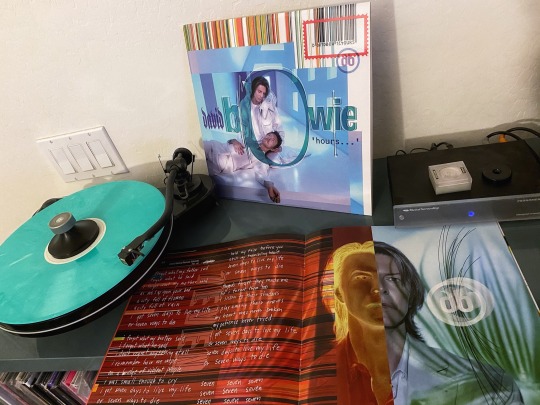
0 notes
Text
DAVID BOWIE/REEVES GABRELS/XAVIER DESPAS- Nomad Soul. Music from the Omikron Video Game soundtrack.
Music for the video game Omikron: The Nomad Soul by David Bowie, Reeves Gabrels & Xavier Despas, pressed by Bureau Supply. Excellent quality studio recordings made as he was building Hours... this plays a lot like a motion picture soundtrack and is packed with 34 wonderful tracks, sonic experiments, textures, occasional vocals & many grooves. It’s certainly possible that we will see this get the official treatment in some form or another - it deserves it - and it sits well in his discography. It reminds me of Buddha of Suburbia at times, with plenty of The Leon Suites, Outside and Earthing thrown in - and of course some of these tracks found new titles and appeared on Hours. Hearing these early versions and de-contextualized from the navel-gazing introspection of Hours is really interesting. Reeves and David were a pretty potent creative unit at this time, buoyed by the use of computer tech to record and manipulate sound, and this is a great example of DB in an aural playground. Lots of freedom from the pop song structure to wander where he will.
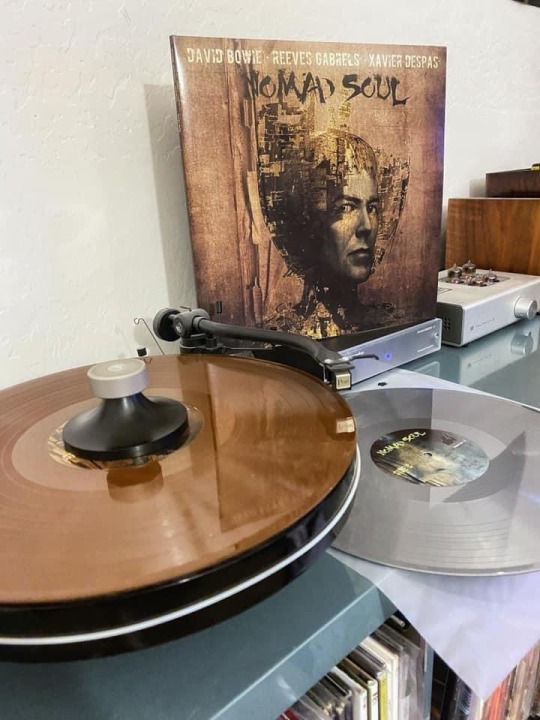
0 notes
Text
David Bowie - VH1 Storytellers
Yeah wow. First time on this format, with four bonus tracks (Survive, I Can’t Read, Always Crashing In The Same Car, If I’m Dreaming My Life, all from the DVD edition) vinyl-specific remaster and lacquer cut by Ray Staff at AIR, and pressed at Optimal Media GmbH. Translated, that means it sounds freaking amazing.
This is an extraordinary setlist, and according to the liner notes caused enough consternation to compel the executive producer of the show to make a special trip to DB’s rehearsal studio to “talk some sense into him.” Bowie asked simply to be trusted.
Listening here, a decade later from its original release, I’m struck by how much craftsmanship is on display here from each and every musician in this band. So tasteful and beautifully balanced, it’s an absolutely professional affair, and is the perfect counter to DB’s sort of “roll-with-it” sense of humor, ad-libs, and voice impressions. It *feels* very hand-me-that-guitar-and-I’ll-play-you-a-tune, but it *sounds* like these arrangements where hashed out for months with sweat and late nights.
So, so many great moments all over this show - you can hear them for yourself of course - but how amazing is Word On A Wing? His description of his life at that time, followed by that performance never fails to take my breath away. Also my favorite version of Survive personally. Maybe it’s contextual, but this performance of Survive feels so honest and impassioned. Life On Mars is pretty incredible too, but at this point in his career I don’t think he ever delivered an even mediocre rendition of that power work. Also an excellent and unique arrangement of I Can’t Read that sees DB making some interesting melodic decisions, and Reeves managing subtle guitar feedback wonderfully. And blending the coda of that song right into Always Crashing In The Same Car? Brilliant. And closing with If I’m Dreaming Of My Life has a potency that you can’t help but recognize if you’ve followed his career closely; it’s inclusion here speaks volumes.
This is a record I happily recommend to my “I don’t get David Bowie” friends. It’s very non-confrontational sonically, and DB’s personality shines as both genuinely funny and deeply sincere. With the exception of the crushing heft of Blackstar, this is the only other DB recording that still makes me feel the impact of his loss pretty acutely.
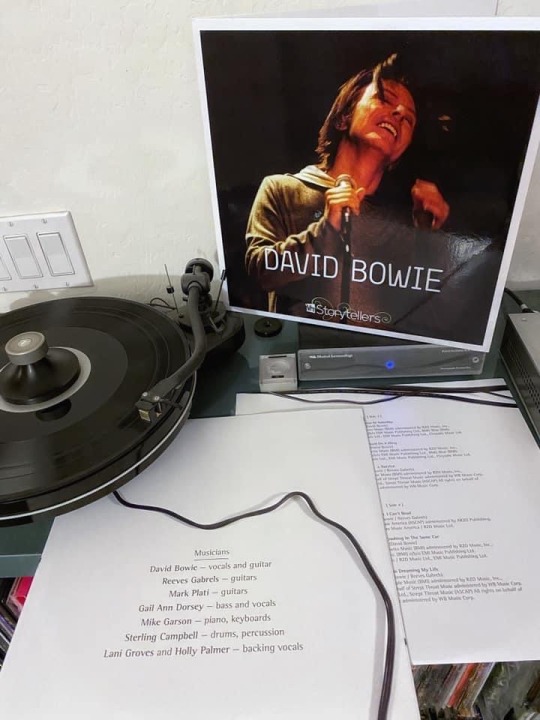
0 notes
Text
David Bowie - liveandwell . com (1999)
Really nice to have this included in Brilliant Live Adventures. Originally mixed by Plati, Gabrels and Bowie himself, this was submitted to Virgin in late 1998 for official release only to be rejected. This latest iteration gives the mix full credit to Plati, co-prods to Plati/Gabrels and produced by David Bowie. It’s a real “musicians mix” and has some odd and creative aspects and balances/panning tricks to it that you’d not necessarily get from a studio engineer approach. The audience is mixed higher than most of DB’s live records and there is a fantastic and very controlled kinetic energy to these performances.
Some highlights for me: I’m Deranged is totally awesome. Gail’s bass sound is atypical for her and perfect, and the effect used on DB’s voice is arresting. Some really incredible alien synths layered and sliding and stacked; with some truly brilliant drumming from Zach and relatively subdued but effective acoustic piano from Mike. They let the arrangement break down, punctuated with triggered samples and space, and it’s a wild perspective on an already excellent track. It a very “studio” sounding piece to get lost in, only to be surprised with the swell of applause that it was absolutely live.
The Telling Lies interpretation has a menace to it that I really like. Much of that comes from DB’s vocal approach - and you get a similar sense of that with the next track The Motel. Absolutely outstanding vocal here. It’s one of those vocal performances where the band seems to almost disappear for a time as DB builds this love-forsaken aural world. In comparison to that monolithic track, The Voyeur Of Utter Destruction sounds positively joyful. Mike Garson’s piano pounding blending with more alien Theremin-like synths moving into a great Reeves Gabrels guitar solo (one of my favorites from him) makes for an incredible close to record one and Bowie’s laughter after shows he knows it hit hard.
I always love Seven Years In Tibet when I hear it - it’s a fabulously arranged song, with its Doors-meets-carnival mid section, sassy sax and the numerous guitar sounds Gabrels moves effortlessly though. Gail also stands out here with a simple forceful bassline that drives the tempo and lets Zach syncopate and slip and slide around behind.
The original BowieNet-only CD release back in the day ended with Little Wonder I think, and I was interested to see this D-side closing with Pallas Athena and finally V-2 Schneider. I suppose it’s an odd decision that will either sink or swim for some people, but I like it. Since they both sit on their own D-side, they feel more like bonus tracks than part of a live show. Once Pallas Athena’s rhythms begin, you can immediately see how it fits within this particular band’s soundworld and it’s added weirdness is a plus to a relatively mundane original. It feels more akin to The Buddha Of Suburbia in this form than Black Tie White Noise. The channeling of Speak & Spell era Depeche Mode transition to V-2 is a jolt, well done and packs a nice wallop of nostalgia once those familiar chords arrive. The overt nod to early synthesized sound is nice in this context, and I swear there is some vocal percussion in there, beat-box style, probably samples triggered by Zach. Who knows. Both these tracks highlight how well-recorded and mixed liveandwell is.
All-in-all, another win for the Brilliant Live Adventures box set and it’s mix and approach sets it apart from others in the set.
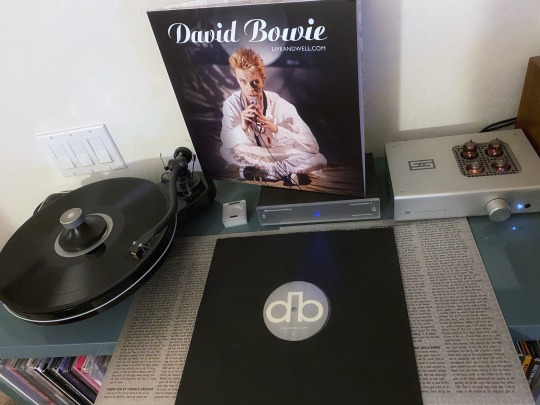
0 notes
Text
David Bowie - Accidental Sirens
I actually waffled a bit on this purchase. It’s an audience recording, and I’ve heard a handful that are great, I’ve made some myself with a nice mic and a smuggled MiniDisc recorder, but the majority of them out there just suck. A few things changed my mind: It’s Bureau Supply and nothing they’d put out had even remotely sucked; I’ve seen DB four times and this was my favorite tour; and this show in particular is just awesome. DB is in fine form... I’d heard mp3 files of most of it, but this could be a nice grab - especially if unedited of all DB’s audience banter and descriptive commentary - which it turns out to be, brilliantly.
This is a 4xLP of the September 22, 1997 show in Detroit, Michigan. It's a *long* set. The show started significantly earlier than expected - Bowie says they just all felt they wanted to play as much as possible, so they got 30 songs in. It's solid quality - Lower Mids/Upper Lows are somewhat cloudy, bass is a bit thumpy and amorphous, like you'd expect in some theaters - but Bowie's vocals are solid and clear and the guitars just okay. The audience noise isn't bad at all, even welcome at times. It’s an amazing show. That snazzy version of My Death with drums and jazz guitar and piano is hard to find elsewhere in physical form I think. And of course the naughty version of Jean Genie with Bowie singing about his "little schoolgirl" is classic, as well his description of sub-bass making people go to the bathroom. V-2 Schneider, O Superman, Dead Man Walking, Seven Years In Tibet, Always Crashing I’m The Same Car, The Supermen, Panic In Detroit... some amazing tracks here. And of course that amazing acoustic show opener with Quicksand that takes me right back in time.
Recorded two months after Look At The Moon and a month before Liveandwell, it’s an exhaustive and valuable look at the entire flow of a DB show during this great tour. Even with all this newly released and wonderful sounding work from this period, this will still find its way to the turntable.
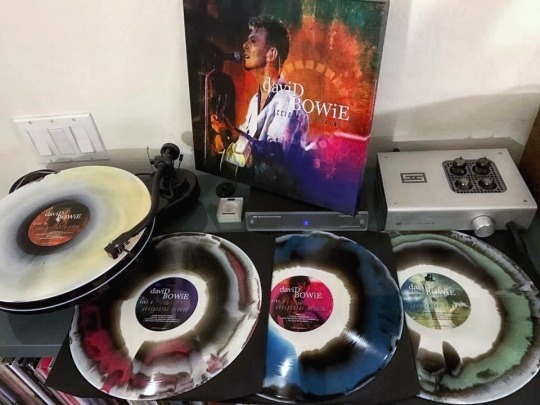
0 notes